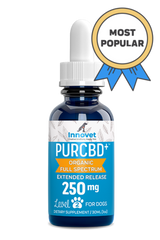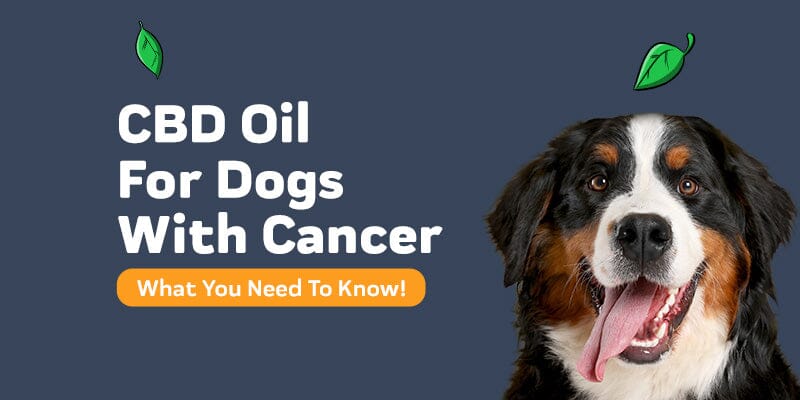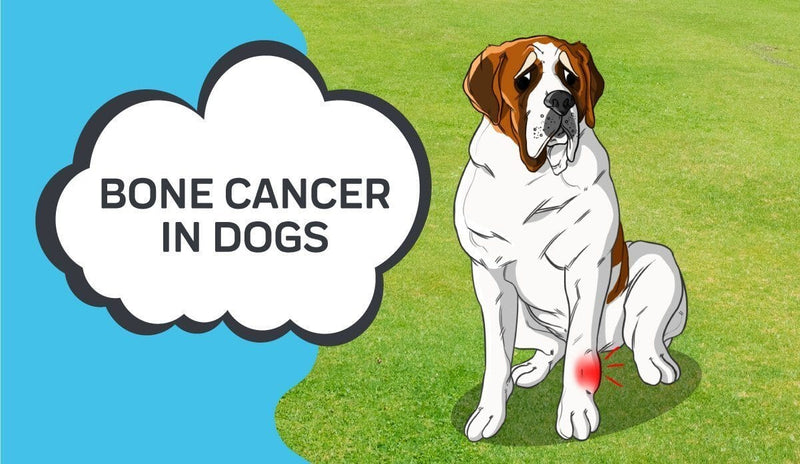
No one wants to discover that their dog has lymphoma, the most common kind of cancer in dogs. Unfortunately, it is the reality for many pet owners. If you have already learned that your dog has lymphoma or fear that it does, read this blog post to learn about the disease and how CBD oil for Lymphoma in dogs may alleviate a lot of emotional and physical pain for your dog and you.
- Understanding Lymphoma in Dogs
- The Lymphatic System
- Canine Lymphoma
- Symptoms of Lymphoma in Dogs
- Traditional Treatments for Canine Lymphoma
- Side Effects of Chemotherapy in Dogs
- CBD Oil for Lymphoma in Dogs
- How to Use CBD Oil for Lymphoma in Dogs
- Choosing A CBD Oil for Dogs
- Administering CBD Oil for Dogs
Understanding Lymphoma in Dogs
Lymphoma is a group of cancers that affect humans and dogs that can very simply be described as a cancer of the lymphatic system.
This is a vast and important system in the body that influences the immune system and other crucial bodily functions. Not only does it impact many bodily functions, and therefore interact with many parts of the body, the lymphatic system itself is very complex and dependent on its various parts for each basic function. The whole system and its point for existing depends on movement all over the body, so lymphoma is not as contained as we think of most cancers. It doesn't start in one place with one tumor
The Lymphatic System
The lymphatic system is a drainage network involved with both the immune and circulatory system. It is made of up several parts, lymph nodes and other organs such as the spleen, appendix, and tonsils, lymph vessels, and lymph fluid. It's all about the distribution and cleansing of that lymph fluid.
Lymph fluid is a watery substance that escapes from the circulatory system, and it is made of escaped material dogs need and waste materials. The lymph system picks it up and carries it where it needs to go, which takes it all over the body. If not for the lymph system, this fluid would build up in the body, causing swelling and the buildup of toxins.
While the lymphatic system moves lymph through the body, carrying the good where it needs to go, it also filters out bad things, like germs and toxins. White blood cells are in the lymphatic system, so that immune system action we hear about where white blood
Canine Lymphoma
Canine lymphoma is a broad term for more the than 30 different types of cancer that attack a dog's lymphatic system. It is very similar to non-Hodgkin's lymphoma in people, so similar that the chemotherapy treatment is almost identical.
It begins like other cancers as a single tumor, but because the lymphatic system's function is to spread fluid all over the body to various organs, it is not likely to stay that way for long.
There are many types of lymphoma, so they, thankfully, do not all spread at the same rate. Some are more contained. Unfortunately, the most common lymphoma in dogs is one that does spread rapidly, multicentric lymphoma.
Canine lymphoma is broken up into stages like human cancers. These are based on the degree to which it has spread through the body.
The World Health Organization has designated the lymphoma stages as follows:
- Stage I - cancer is contained in a single lymph node
- Stage II - cancer is contained in multiple lymph nodes on one side of the diaphragm (either the top or the bottom of the dog).
- Stage III - cancer is only contained in the lymph nodes themselves
- Stage IV - cancer is located in the liver and spleen or hepatosplenomegaly, whether it started there or spread there.
- Stage V - cancer is in the bone marrow, central nervous system,
Symptoms of Lymphoma in Dogs
The symptoms of canine lymphoma vary by the type of lymphoma, but there are many common symptoms to be on the lookout for.
The first and most common symptom of canine lymphoma is the presence of a swollen lymph node, or several. This will be a firm, rubbery lump underneath your dog's skin. Thankfully, a swollen lymph node isn't painful for the dog.
If you know where their lymph nodes are, you can recognize that it is these nodes that are swollen, and if you don't already know where your dog's lymph nodes are, you may want to learn and start getting accustomed to feeling for them while petting your dog. Should one or more of these be swollen, you need to get them to a licensed veterinarian as soon as possible.
Take comfort in the fact that it is not guaranteed that a swollen lymph node means cancer. Like with humans, a simple infection can cause it, but because canine lymphoma is so serious, you should waste no time getting it checked out.
While swollen lymph nodes are the most common symptom, they are not always present or easy to feel. Some lymph nodes are located in places where they may be hard to notice. Your vet may notice them during a routine checkup. You can also take the added precaution of making yourself aware of the other common symptoms of canine lymphoma.
Other common symptoms of lymphoma in dogs:
- lack of appetite
- weight loss
- lethargy
- fatigue
- edema (or swelling) of the face or legs due to inadequate fluid drainage
- occasionally increased thirst and/or urination
Because there are so many kinds of lymphoma, some of them have very different symptoms.
Cutaneous lymphoma affects their skin, appearing as dry, red, flaky patches that can spread all over their body. It may be accompanied by masses under the skin. This one is a slower-growing lymphoma.
Gastrointestinal lymphoma affects their digestive system, and its symptoms include diarrhea, vomiting, foul-smelling excrement, and rapid weight loss.
Traditional Treatments for Canine Lymphoma
Canine lymphoma is not a curable disease. It can go into remission, but that means it is also likely to return. According to the National Canine Cancer Foundation, the median time before lymphoma returns is 6 to 12 months. In 20 to 25% of cases, dogs live 2 years or longer after the cancer has gone into remission, and even if it returns and they undergo a second treatment, they still have a median survival rate of 336 days. That means canine lymphoma treatments may give your dog an additional 3 years of life, or more.
Surgery is not the primary treatment because of the traveling nature of the disease. Chemotherapy is the most common option, with radiation and surgery being used in conjunction sometimes when it is beneficial to treat a mass or specific area.
Veterinarians treat the dog to hopefully make the cancer go into remission or to manage their symptoms so they can enjoy a higher quality of life. If the cancer goes into remission, there will be no detectable signs of the disease and the dog will suffer no more symptoms unless the cancer returns.
It is important to start the treatment as soon as possible. Many pet owners are tempted to put off the chemotherapy because their dog does not act sick yet and they fear the treatments will make them sicker than they have to be, but the treatment is much more effective when begun while the dog is in a healthier state. The cancer has a great likelihood of going into remission, whereas, if you put the treatment off until the dog is suffering, remission may no longer be possible.
IVG hospitals reports that "remission is achieved in 80-90% of dogs and typically lasts 6-9 months. The length of remission depends upon many factors including the primary site of the cancer, how sick an animal is at the start of treatment and the extent of disease."
Side Effects of Chemotherapy in Dogs
Thankfully, chemotherapy is not as hard on dogs as it is on humans. It is possible that they may not suffer any negative side effects at all.
If your dog does suffer negative side effects of chemotherapy, they may be:

-
neuropathic pain immediately following the treatment
-
lethargy for a couple of days following treatment
-
diarrhea
-
vomiting
-
lack of appetite
-
whisker loss is common
-
thinning fur and fur loss are rare in most dog breeds
-
extreme tiredness
-
infection
IVG hospitals says only 5% of patients experience such symptoms. If your dog does suffer negative side effects, their vet will try to tailor the drugs to lessen these side effects and still treat the disease.
If your dog has a bad time with the chemotherapy and the problem can't be rectified,
CBD Oil for Lymphoma in Dogs
CBD oil can help dogs with lymphoma as an alternative for helping improve cancer or to manage the symptoms of the disease or side effects of chemotherapy. There has been a great deal of research recently proving that humans and dogs have what is called an endocannabinoid system that impacts many of the body's functions. Dogs actually produce cannabinoids in their body and they need a certain amount of them to be and feel healthy. Many scientists and licensed veterinarians tout the effectiveness of CBD oil to manage many hard-to-treat ailments, symptoms of those ailments, and the side effects of medications.
CBD oil is an extract from the hemp plant, but before you start picturing your dog being high, the hemp plant and CBD oil do not contain enough of the chemical in marijuana, THC, that produces a high to have any effect. CBD oil does offer many health and even nutritional benefits and can be a lifesaver at times when your dog is suffering and nothing else seems to help.
CBD Oil for Dog Lymphoma Symptoms and Chemotherapy Side Effects
CBD oil studies have shown it may have many benefits, some of which can be of immense value to your dog with lymphoma.
CBD oil is noted as a natural pain reliever, so if your dog starts showing symptoms of pain from either the cancer itself or chemotherapy, CBD oil may be just the safe and natural solution you need to make them feel better.
If your dog has one of the lymphomas known for causing inflammation, CBD oil may help as a natural anti-inflammatory.
CBD oil is also becoming a popular way to naturally improve nausea, vomiting, diarrhea, and loss of appetite. It can even provide some additional nutritional benefits as well.
It is also a great way to increase energy levels in your dog and to help if they suffer anxiety from vet visits.
CBD Oil for Lymphoma in Dogs as a Natural Alternative
CBD oil shows promise as a natural alternative for traditional cancer medications. The information is not definitive yet, but if your dog is not responding well to traditional treatments, you might discuss this as a possibility with your vet.
If your dog's cancer is too advanced to be treatable by conventional methods,
How to Use CBD Oil for Lymphoma in Dogs
Types of CBD Oil for Dogs
CBD can be administered to your dog in several forms, so you can find the one that your dog likes the best. We all know how difficult it can be to get a pet to take a medication, so the makers of CBD oil products for dogs supply various options to suit picky palates, such as Innovet Hemp and CBD products.
CBD oil tinctures are CBD oil mixed with something to make it easier, and usually also tastier, to take.
These often come with a dropper, pump, or sprayer to administer the CBD oil directly in the mouth or to add to their food.
CBD capsules mask the taste of the oil, so it may be easier to get your dog to take these.
There are also treats with CBD oil in them. These come in both crunchy and chewy forms to suit your dog's taste buds. They should eat them up about as readily as they do their other treats.
For skin-related symptoms or localized symptoms under the skin, CBD topical products
Choosing A CBD Oil for Dogs
Choosing the type
The purer the CBD oil option, the better. Meaning if they will take the tincture, you can feel you are more easily controlling the amount of CBD they get, the cannabinoid will work faster, and it's the best value. If your dog won't take CBD oil directly or it's too stressful trying to get them to, capsules or treats are definitely the way to go.
Product quality and safety
Do read the ingredients in any CBD oil product to ensure you are giving your dog the safe product you think you are. Be mindful of where the company says they acquired or grew their hemp and that their products are third-party tested for the amount of CBD oil it claims to contain. You can also often find CBD oil derived from organic hemp. Most will say they are all-natural because customers buying CBD oil are likely to prefer natural products.
Full-spectrum vs isolate
You should also know the difference between full-spectrum CBD and CBD isolate. CBD isolate is just CBD oil as opposed to full-spectrum CBD which is an extract made from the entire hemp plant and still contains the nutrients and added cannabinoids found in the whole plant. Most people want full-spectrum CBD, but there are legitimate reasons why someone wants just CBD isolate, such as wanting the value of buying just the one cannabinoid if that is all they want. There isn't anything wrong with isolate, you should just know you are buying what you think you're buying.
Extraction methods
Administering CBD Oil for Dogs
Amounts needed to vary by the dog's weight and their unique body. Read the instructions on whatever product you choose and adjust down or up depending on their needs. You might discuss your choices with your licensed veterinarian if you feel unsure of what you're doing. Don't worry though. CBD is non-toxic to dogs and the worst symptom is known from giving a dog too much CBD is that it may have a sedative effect.
Sources:
Treatment of Lymphoma in Dogs
Intestinal Lymphoma
CBD and Lymphoma
CBD: Safety and Side Effects
CBD and Appetite
CBD May Help Support Inflammation

Thanks for stopping by!
P.S. We Love You!
Sincerely,
The Innovet Team
Please do not ask for emergency or specific medical questions about your pets in the comments. Innovet Pet Products is unable to provide you with specific medical advice or counseling. A detailed physical exam, patient history, and an established veterinarian are required to provide specific medical advice. If you are worried that your pet requires emergency attention or if you have specific medical questions related to your pet’s current or chronic health conditions, please contact or visit your local/preferred veterinarian, an animal-specific poison control hotline, or your local emergency veterinary care center.
Please share your experiences and stories, your opinions and feedback about this blog, or what you've learned that you'd like to share with others.


















